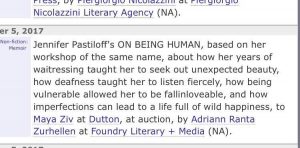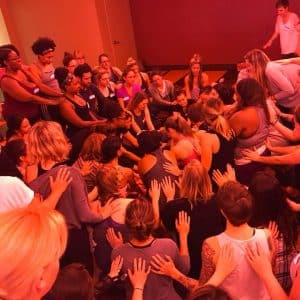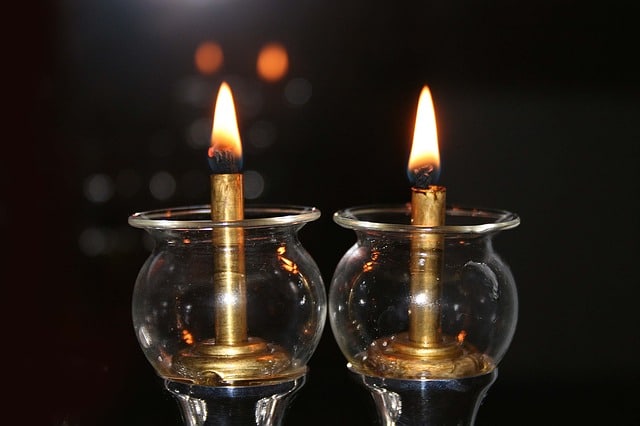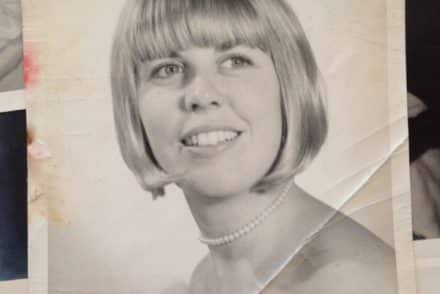By Magin LaSov Gregg
The LeVees
In our sodden delta parish, December means sweater weather, fleece parkas, fairy lights twinkling along the bayou. At night Carl and I sip monk beer on our back patio while a cat curls up at our feet. We sit beside azalea bushes, in the shadow of oleanders, and watch the pale moon glow. Autumn leaves don’t change colors here. They dry out, become brittle and papery, then fade from green to brown by Hanukkah.
This year I’m observing my second Hanukkah in Louisiana, and I’ve done the thing I never expected to do. I said yes when Carl asked me to marry him. At this time in our lives, he’s a Baptist minister, and he serves a small congregation known as the “gay church” in town. He’s the only minister between Jackson, Mississippi and Shreveport who will officiate at same sex weddings. Recently, I fretted when he stood in a gazebo across from the court house and blessed the union of two women while cars whizzed along a busy road –– this is 2006, nine years before Obergefell v. Hodges. Our parish carried David Duke during his bid for U.S. Senate. And a few years before I moved to town, someone left a burning tire on the front yard of one of Carl’s colleagues, who’d spoken out against Christian prayers being broadcast on the intercom system of a local high school. I tell few people I’m Jewish, and we keep our address unlisted. Yet Jews view me with suspicion too.
“You would be a great candidate for Jews for Jesus,” my best friend told me when I started dating Carl. This was not a compliment. Among Jews, “Jews for Jesus” is an oxymoron, or just moronic. My friend was in the moronic camp. Maybe she had good reason to worry. At 21, I’d fled Baltimore after my mother died. First, I’d gone to Scotland, where I dated a man whose mother believed my hanukkiah was “of the devil.” Then I moved to this delta parish off Highway 20, where I rented an apartment near the Ouachita River.
On Hanukkah, our first Hanukkah after our engagement, Carl brings a new CD home. The CD features a silver drum on its front cover. A blue hanukkia is emblazoned on the drum, and a band name scrolls across the top of the CD: The LeeVees. I’ve never heard of the band, its name a pun on the Jewish surname, Levy, a variant of Levite, which identifies the ancient priestly class. The name LeeVees makes me think of levee, a word emblematic of the home I’m making here in the delta. Levee means “landing place.”
Hanukkah is also a holiday about landings, about arriving back home after a long absence. The LeeVees allude to this meaning in the CD’s penultimate song, “Nun Gimmel Heh Shin.” The song’s title signifies the Hebrew letters that are imprinted on four sides of a dreidel, a traditional Hanukkah toy. The letters form an acronym for the Hebrew expression, Nes gadol haya sham. A great miracle happened there. The expression commemorates the Maccabee’s rededication of the Temple after Syrian-Greek occupation, when a small triumphant band of rebels arrived home after forced exile.
Nun. Gimmel. Heh. Shin. We sing while we’re washing dishes, tidying up the kitchen. I ponder the strangeness of being a Jew in the delta, a Jew engaged to a Baptist pastor. In this home with Carl, I am solely Jewish. Beyond the walls of our house, I am different, other. I do not say, Shalom y’all like the Jews in town. At the sole Reform temple here, I read prayers softly, and try not to stand out. My Hebrew accent is different, reflective of my twelve years training with skilled teachers, some of whom were Israeli. I can lead a synagogue service when the rabbi is out of town, and I even teach religious school on occasion. In the eyes of my mother’s family, I’m somewhere between Jewish and Christian, perhaps a shady Jew for Jesus, or like my Irish Catholic father who I haven’t spoken to since I was 15. But in our kitchen, where Carl and I sing nun gimmel heh shin, I’m nothing other than Jewish.
Nun
We spin wooden tops on our desks at Hebrew School. They whirl like tumbling leaves, slowing with each rotation. I cross my fingers when the Hebrew letters inscribed on each side of the top become visible. Each letter means I can take more or less of the candy situated in the center of our table. Landing on nun means I take nothing. Landing on gimmel means I take everything. If I land on heh, I take half. If I land on shin, I take five pieces of candy. I silently pray the toy won’t land on nun, the Hebrew letter that sounds like an “n,” a sound that slams like a door in my mouth. Nun means no golden foil wrapped gelt. No paper enfolded Bazooka bubble gum. No silvery Hershey Kisses.
I almost always land on nun.
This year, the year I’ve started Hebrew School, I am six. I can write my name in English and in Hebrew. My favorite movie is The Sound of Music, and I sometimes skip around the courtyard of Har Sinai Congregation and sing “My Favorite Things.” I’ve told both my parents I want to be a nun like Maria Von Trapp. My father is ecstatic, except he doesn’t want me to be mean like Sister Mary Maria, who smacked his wrists with a ruler each time he wrote with his left hand, the way I write now. My mother’s lips tightened when I shared my news. “You can’t be a nun,” she told me. “You’re Jewish.”
In Hebrew School, Morah Pearloff tells us Judaism passes from mother to child. If you have a Christian father, like I do, it doesn’t count. But my last name McKenna makes everyone think I’m Catholic, especially since my first name is Magin. As time goes on, I’ll learn to see myself as a kind of nun, neither Jewish nor Christian, a nothing with nowhere to land.
The Levee
Two blocks from our Louisiana delta house, a levee slopes beside the river. On Shabbat, Carl and I walk the levee for hours. Lost in conversation, we wind past spindling pines and persimmon trees, toward a grove where horses sometimes graze. I spy foxes and water moccasins, kudzu and cattails. On Friday nights, I no longer go to synagogue, preferring to ride my bike on the levee instead. On Sundays, when Carl is at church, I jog here and think of Emily Dickinson with “a Bobolink for a Chorister.” Sometimes I remove my shoes and stand barefoot on the levee’s pebbled path, on tiny white shells extracted from South Louisiana barrier islands. Hineni. Here I am. Holy ground.
As I look out at the black water, I think of my mother, whose ashes I have not yet scattered. I still dream of her, still awaken screaming her name. “It’s okay,” Carl murmurs to me in the middle of the night, even though we both know it will never be okay that she is gone. At 25, I have no parents to speak of, not even in the divine sense, the way Christians I interview on my religion beat talk about God as everyone’s father.
Still, I want to understand faith. I want to know what it means to stake belief in mystery, in things unseen. Can my mother be present even as she is absent? I want back the faith I’d lost when she died. Like the narrator of Emily Dickinson’s “I never saw a moor,” I long to believe something larger than my own myopic reality exists. Secretly, I hope this unusual relationship Carl and I are forging will become a kind of ecclesia for me, a new home, a devoted congregation of two, a place to stake my wobbly faith.
Gimmel
I don’t know the rabbi my aunt refers me to, but she roomed with his wife on a synagogue trip to Israel and thinks he’ll agree to marry Carl and me in his synagogue, a megashul in the Park Heights neighborhood of Baltimore. I’m in my car when he calls me, driving along Highway 20. A piney woods flanks the road on either side. Tall trees tower over my Toyota. I give my usual spiel to the rabbi. My fiancé is a Baptist, but liberal. His denomination ordains women, gays and lesbians, is almost a Christian equivalent of the Reform movement in Judaism. I save the best part for last, the part where I say Carl believes one way for Christians to atone for centuries of violence against Jews is to, “bring more Jews into the world.” He’s committed to marrying me in a synagogue, to practicing Judaism in our home, to raising any child we may have as a Jew.
But the rabbi’s voice rises like a knife when I finish speaking. He refuses to marry us. For a moment, I am stunned into silence. What more can I do to assure him of our commitment to Judaism? I press for details, and he says, “I don’t approve of children being raised in homes that aren’t uniquely Jewish.” We aren’t unique? I want to ask. Instead, I retreat into obedience, politeness. This is how I’ve been conditioned –– he’s a rabbi. He must know best. I thank him for his time, then hang up before my voice quakes.
For a week, I’ll wet my pillow with tears each night while Carl rubs my back. We are all-in when it comes to each other, to practicing Judaism as a family. If Carl had been born Jewish, ancient rabbis would have called our relationship b’shert. Meant to be. Since he’s not Jewish, no rabbi I talk to wants anything to do with us. Their all-or-nothing attitude breaks my heart.
Guilt
In the Jewish bookstore near Baltimore, I avoid the gaze of a man inscribing my wedding band with the Hebrew sentence Ani l’dodi v’dodi li –– I am my beloved’s and my beloved is mine. The man wears a black suede yarmulke on his his head. Tzitzit from a prayer shawl dangle toward his pockets. He said “mazel tov” when I handed him my ring. I smiled. Not many Jews have uttered this Yiddish expression that means “good luck” when I’ve shared news of my upcoming wedding. The cantor who agreed to marry us seemed wary when we met with her. She referred Carl to books he’d already read in seminary, assuming he knew nothing about Judaism. She’s an outside cantor, not affiliated with the the megashul where the senior rabbi refused to officiate. He gave the cantor permission to marry us in his sanctuary, likely because of my aunt’s connections. I have the shameful sense that our synagogue wedding is happening through the backdoor, but I pretend to feel grateful for the scraps we are handed.
When the man inscribing my wedding band asks what my future husband does for a living, I say he runs a nonprofit. It’s a lie by omission. A lie I’ve practiced.
I love Carl, and yet I feel like I am doing something wrong by marrying him. Perhaps the rabbi’s disapproval has seeped into me. A famous line from “Fiddler on the Roof” comes back to me: A bird may love a fish but where would they build a home together? Now I no longer know what home means. When I lost my mother, I lost my first home. I lost everything I thought my life would be.
In the bookstore, I slide my wedding band back inside its box, then tuck the box into a velvet pouch. I imagine the ring encircling my finger to form a new, protective enclosure, a bayit shalom, a house of peace that exceeds my once limited imagination.
Gelt
A few months after our wedding, Carl brings home gelt from a trip he has taken. In our parish, we can’t find this Hanukkah candy that was ubiquitous throughout my childhood. My mother’s mother, my Bubbie Fran, used to bring dollar-store gelt to our Hanukkah party each year. Our candy coin gelt did not come with an ingredient list, but it did come wrapped in gold foil that imbued the chocolate with a metallic taste. In some years, the foil came stamped with religious symbols. A dreidel or menorah. Other years, the gelt parodied American coins, complete with images of famous presidents. I didn’t like the waxy paraffin taste of my grandmother’s gelt, but I pretended to be excited when she handed a bag of candy coins to me. I rarely held real money in my hand.
We lived on my mother’s disability checks and meager child support a judge detached from my father’s wages. We qualified for foods stamps and free and reduced lunch, a secret I kept from my affluent friends. I knew the stereotype that Jews were rich, and I felt fraudulent as a Jew because we were poor. For a few brief moments each Hanukkah, our gelt let me believe otherwise, let me step inside the circle of inclusion.
The gelt Carl and I eat during our first married Hanukkah has a different meaning, one that reverberates though our marriage. While I drift away from Judaism, he will drift toward it, and away from his own Christian faith. He will ensure we light the hanukkiah each year. He will make sure we always have a place to go on Yom Kippur, and on Passover. He will tend to my faith, even as it sputters inside me like a low grade flame.
Heh /Shin
Carl’s Meme Helen stands over me as latkes sizzle in her cast iron pan. It’s Christmas Eve, a rare year when Hanukkah and Christmas overlap. We are adding latkes and a silver hanukkiah to the Christmas Eve table, already set with placemats tatted by Carl’s other grandmother Grace, his mother’s Christmas Spode china, and silver Meme Helen received at her wedding in Gastonia, North Carolina. Meme Helen has helped me grate the Yukon Gold potatoes by hand. We used the method she learned from her mother, who ran a boarding house in Gastonia. Now, as we watch latkes turn golden brown in canola oil, Carl’s mother, Bonnie, enters kitchen. She’s in a chatty mood.
“Your mama was Jewish, but not your daddy?” she asks. “Tell me again how that works?”
Bonnie has never met either of my parents, since I didn’t invite my father to our wedding. Judaism fascinates her. Growing up as a Southern Baptist, she knew few Jews. The first time she entered a synagogue was for mine and Carl’s aufruf, when we stood up to receive a blessing at the Shabbat service prior to our wedding. Once again, I explain the rabbinic law of matrilineal descent to Bonnie, how Judaism passes from mother to child because in ancient times paternity couldn’t be assured.
“This is why we’ve chosen Judaism as our family’s religion,” I remind her. “I pass down the faith.”
Bonnie nods, then smiles. She loves having a Jewish daughter-in-law and has already laid my Christmas presents under the tree. I know they’re mine because Bonnie wraps my gifts in Hanukkah wrapping paper.
“Was that hard for you?” She asks, flipping a latke. “Having a mama and a daddy with different religions?”
Bonnie leans close. She smells soapy, like my mother, and has the same softness to her voice. I have so many moments where I saw my difference magnified, I don’t know where to start. The man who mocked my Irish last name at a J.C.C.? The Jewish children who called me a half-breed? The Orthodox Hebrew teacher who said I would not be considered wholly Jewish by certain rabbis in Israel? But I don’t want to spoil our night, or make Bonnie sad. She worries too much about me, like my own mother would.
“It was hard sometimes,” I tell her. “Being different is always hard.”
“Bet it made you stronger,” she says, then flips a caramel colored latke onto a Spode platter.
I don’t disagree with her. If I hadn’t felt different among Jews, hadn’t learned to feel like a half or a nothing instead of a whole, I’d have never have moved to the delta, to this fertile land that led me to Carl.
Nes Gadol Haya Sham
During Advent, I find a box of Hannukah candles beneath our Christmas tree, not far from Carl’s backpack. At first, I think he’s left them out to remind me to light our menorah, but he’s placed them there for another purpose. To remind himself to take a menorah to work. Nearly ten years into our marriage, we live in a row-house six miles from the Monocacy River, in Frederick, Maryland. Carl left Christian ministry in 2012 to become a Unitarian Universalist. The candles he left beneath our tree will also go to his congregation, which observes Christmas and Hanukkah.
At night, we sit on our couch, in the glow of a Christmas tree, beside a hanukkiah awaiting its candles. Two sleepy dogs curl up between us. Two cats lay at our feet. I feel more fortunate than I have a right to be, like I built the life I needed on the ruins of a broken dream. I used to celebrate the great miracle of the Maccabees, a miracle I believed happened there, to someone else, not me. Now I celebrate something else entirely, the miracles that happened here, to us. Tonight Carl and I are like two flames touching, each gathering our own light, each illuminating the other.
Magin LaSov Gregg’s writing has appeared or is forthcoming in The Washington Post, The Rumpus, Bellingham Review, Hippocampus Magazine, Literary Mama, Under the Gum Tree, and elsewhere.
We are proud to have founded the Aleksander Fund. To learn more or to donate please click here. To sign up for On being Human Tuscany Sep 5-18, 2018 please email jenniferpastiloffyoga@gmail.com.

Join Jen at her On Being Human workshop in upcoming cities such as NYC, Ojai, Tampa, Ft Worth and more by clicking the image above.

Join Jen at Kripalu in The Berkshires of Massachusetts for her annual On Being Human retreat there by clicking the picture above. March 2-4, 2018.




2 Comments
Beautiful piece of writing by Magin. I also thought I’d like to be a nun but I was a Baptist as a ten year old child!
thank you for this. It’s gorgeous-but also, I live in Baltimore (not from here, but here my whole adult life) and I was raised sort of a hybrid that was *technically* Jewish. I long had, sometimes still do, ambivalence and confusion about it.
I love your story. And your telling of it.